高中英语从句的用法大全
高中英语从句
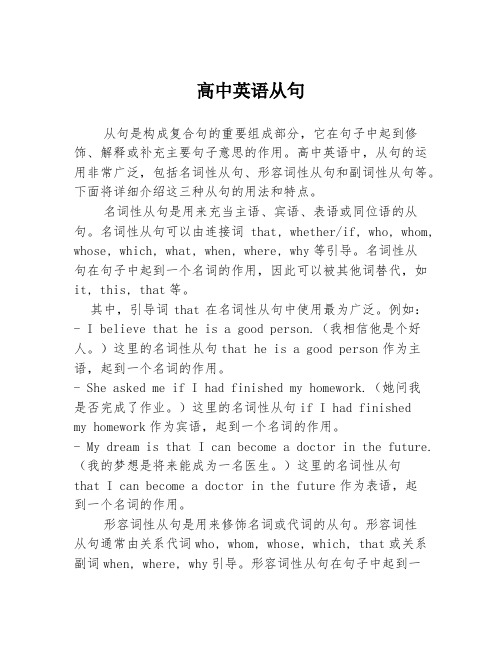
高中英语从句从句是构成复合句的重要组成部分,它在句子中起到修饰、解释或补充主要句子意思的作用。
高中英语中,从句的运用非常广泛,包括名词性从句、形容词性从句和副词性从句等。
下面将详细介绍这三种从句的用法和特点。
名词性从句是用来充当主语、宾语、表语或同位语的从句。
名词性从句可以由连接词that, whether/if, who, whom, whose, which, what, when, where, why等引导。
名词性从句在句子中起到一个名词的作用,因此可以被其他词替代,如it, this, that等。
其中,引导词that在名词性从句中使用最为广泛。
例如:- I believe that he is a good person.(我相信他是个好人。
)这里的名词性从句that he is a good person作为主语,起到一个名词的作用。
- She asked me if I had finished my homework.(她问我是否完成了作业。
)这里的名词性从句if I had finishedmy homework作为宾语,起到一个名词的作用。
- My dream is that I can become a doctor in the future.(我的梦想是将来能成为一名医生。
)这里的名词性从句that I can become a doctor in the future作为表语,起到一个名词的作用。
形容词性从句是用来修饰名词或代词的从句。
形容词性从句通常由关系代词who, whom, whose, which, that或关系副词when, where, why引导。
形容词性从句在句子中起到一个形容词的作用,修饰或限定名词或代词。
例如:- The girl who is standing over there is my sister.(那个站在那边的女孩是我的妹妹。
高中英语从句大全

高中英语从句大全1)表语从句1.定义:用作表语的从句叫做表语从句。
2.构成:关联词+简单句3.引导表语从句的关联词的种类:(1)从属连词that.如:The trouble is that I have lost his address.麻烦是我把他的地址丢了。
(2)从属连词whether,as,as if.如:He looked just as he had looked ten years before.他看起来还与十年前一样。
The question is whether they will be able to help us.问题是他们是否能帮我们。
注:从属连词if一般不用来引导表语从句,但as if却可引导表语从句,如: All this was over twenty years ago,but it’s as if it was only yesterday.这都是20多年前的事了,但宛如昨天一样。
能跟表语从句的谓语动词一般为系动词be,seem,look等。
如:It looked as if it was going to rain.看起来天要下雨了。
(3)连接代词who,whom,whose,what,which,whoever,whatever,whichever 连接副词 where,when,how,why.如:The problem is who we can get to replace her.问题是我们能找到谁去替换她呢。
The question is how he did it.问题是他是如何做此事的。
That was what she did this morning on reaching the attic.那就是她今晨上了阁楼干的。
解释:1.连词because可引导表语从句。
如:I think it is because you are doing too much.我想这是因为你做得太多。
高中英语固定句型大全
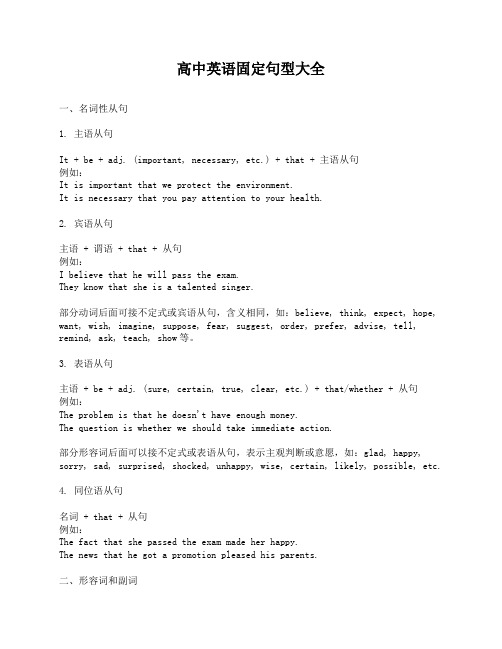
高中英语固定句型大全一、名词性从句1. 主语从句It + be + adj. (important, necessary, etc.) + that + 主语从句例如:It is important that we protect the environment.It is necessary that you pay attention to your health.2. 宾语从句主语 + 谓语 + that + 从句例如:I believe that he will pass the exam.They know that she is a talented singer.部分动词后面可接不定式或宾语从句,含义相同,如:believe, think, expect, hope, want, wish, imagine, suppose, fear, suggest, order, prefer, advise, tell, remind, ask, teach, show等。
3. 表语从句主语 + be + adj. (sure, certain, true, clear, etc.) + that/whether + 从句例如:The problem is that he doesn't have enough money.The question is whether we should take immediate action.部分形容词后面可以接不定式或表语从句,表示主观判断或意愿,如:glad, happy, sorry, sad, surprised, shocked, unhappy, wise, certain, likely, possible, etc.4. 同位语从句名词 + that + 从句例如:The fact that she passed the exam made her happy.The news that he got a promotion pleased his parents.二、形容词和副词1. 形容词的比较级和最高级比较级:主语 + be (am, is, are) + 形容词比较级 + than + 被比较的对象例如:She is taller than her sister.This book is more interesting than that one.最高级:主语 + be (am, is, are) + the + 形容词最高级 + 名词例如:He is the tallest boy in his class.This is the most beautiful painting I have ever seen.2. 常用的形容词和副词beautiful, handsome, pretty, ugly, lovely, attractive, stunning, gorgeous, charming, cute, elegant, fashionable, stylish, glamorous, delightful, etc.good, great, excellent, wonderful, fantastic, fabulous, amazing, awesome, splendid, terrific, marvelous, etc.bad, terrible, awful, horrible, unpleasant, etc.expensive, cheap, reasonable, affordable, etc.fast, slow, quick, rapid, swift, etc.loud, quiet, noisy, etc.hard, easy, difficult, challenging, simple, complicated, complex, etc.high, low, tall, short, long, big, small, huge, tiny, etc.young, old, new, ancient, modern, etc.3. 形容词和副词的用法形容词可修饰名词,也可作表语副词一般修饰动词、形容词或其他副词三、倒装句1. 完全倒装句在以下情况下要使用完全倒装句:a) 句首为表示地点、方式等的介词短语时例如:Under the tree were two cats.In this way, we can solve the problem.b) 句首为表示方位的副词或介词短语时例如:Here comes the bus.Out rushed the students.c) 句首为表示否定、副词only、hardly, seldom, never等时例如:Never have I seen such a beautiful sunset.Not only does he play the piano well, but he also sings well.d) 句首为so, neither, nor时例如:So busy was he that he forgot to eat lunch.Neither do I like English, nor do I like math.2. 部分倒装句在以下情况下要使用部分倒装句:a) 句首为表示条件的介词短语时例如:Should you need any help, please let me know.Had I known your address, I would have sent you a postcard.b) 句首为表示时间的介词短语或副词短语时例如:At no time should you give up your dream.On no account can he stay out late.四、虚拟语气1. 条件句中的虚拟语气a) “与事实相反的条件句”:如果对过去的情况进行虚拟,主句要用“动词的过去完成时”,从句用“动词的过去完成时”或“would/could/might + have + 过去分词”的形式。
高中英语从句分析(完整版)
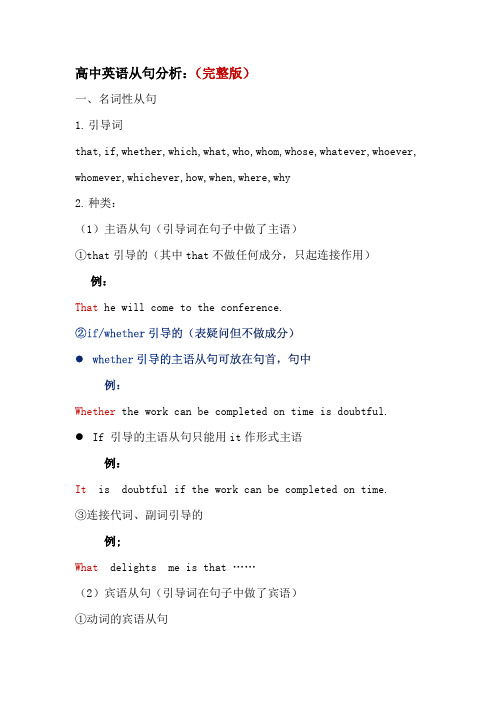
高中英语从句分析:(完整版)一、名词性从句1.引导词that,if,whether,which,what,who,whom,whose,whatever,whoever, whomever,whichever,how,when,where,why2.种类:(1)主语从句(引导词在句子中做了主语)①that引导的(其中that不做任何成分,只起连接作用)例:That he will come to the conference.Whether the work can be completed on time is doubtful.If 引导的主语从句只能用it作形式主语例:It is doubtful if the work can be completed on time.③连接代词、副词引导的例;What delights me is that ……(2)宾语从句(引导词在句子中做了宾语)①动词的宾语从句例:He told us (that) they would help us.②介词的宾语从句(后不跟that,跟wh-类连接词)例:Kate was interested in what she has seen at the park.③形容词的宾语从句(表情感的)例:I am not sure whether they will agree with us.(3)表语从句①Be动词之后的为表语从句例:This is what i am interested in.②注意:●主语名词为reason时,表语的引导词为that不用why和because。
●主句主语为advice,suggestion,order等,表语中的谓语动词用should +动词原形。
(4)同位语从句(引导词是名词,如fact等)①这个从句是用来解释,说明某一名词的内容和实质的。
例:The fact that counties are still suffering poverty is a big problem to the world.二.定语从句1.修饰主句中的某一名词或代词的句子。
高一英语从句知识点
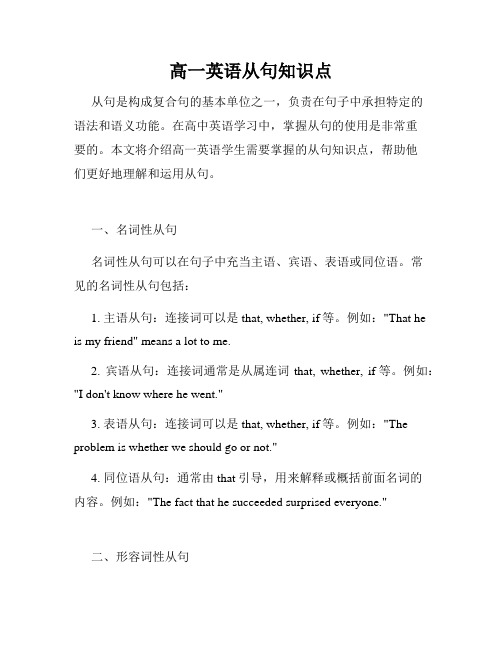
高一英语从句知识点从句是构成复合句的基本单位之一,负责在句子中承担特定的语法和语义功能。
在高中英语学习中,掌握从句的使用是非常重要的。
本文将介绍高一英语学生需要掌握的从句知识点,帮助他们更好地理解和运用从句。
一、名词性从句名词性从句可以在句子中充当主语、宾语、表语或同位语。
常见的名词性从句包括:1. 主语从句:连接词可以是that, whether, if等。
例如:"That he is my friend" means a lot to me.2. 宾语从句:连接词通常是从属连词that, whether, if等。
例如:"I don't know where he went."3. 表语从句:连接词可以是that, whether, if等。
例如:"The problem is whether we should go or not."4. 同位语从句:通常由that引导,用来解释或概括前面名词的内容。
例如:"The fact that he succeeded surprised everyone."二、形容词性从句形容词性从句用来修饰名词或代词,常用连接词有that, who, whom, whose, which, when, where, why等。
例如:"I love the book that you recommended."三、副词性从句副词性从句用来修饰动词、形容词或副词。
常见的副词性从句有:1. 时间状语从句:连接词有when, while, before, after, since等。
例如:"He called me when he arrived."2. 地点状语从句:连接词有where, wherever等。
例如:"I will go wherever you go."3. 原因状语从句:连接词有because, since, as等。
高中英语知识点归纳从句的分类与用法
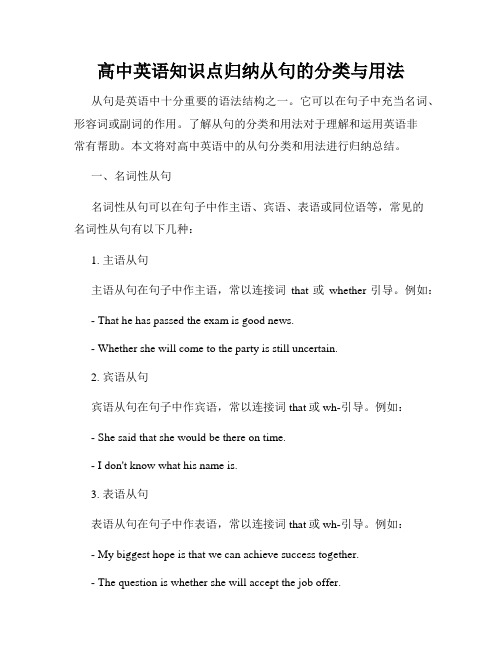
高中英语知识点归纳从句的分类与用法从句是英语中十分重要的语法结构之一。
它可以在句子中充当名词、形容词或副词的作用。
了解从句的分类和用法对于理解和运用英语非常有帮助。
本文将对高中英语中的从句分类和用法进行归纳总结。
一、名词性从句名词性从句可以在句子中作主语、宾语、表语或同位语等,常见的名词性从句有以下几种:1. 主语从句主语从句在句子中作主语,常以连接词that或whether引导。
例如:- That he has passed the exam is good news.- Whether she will come to the party is still uncertain.2. 宾语从句宾语从句在句子中作宾语,常以连接词that或wh-引导。
例如:- She said that she would be there on time.- I don't know what his name is.3. 表语从句表语从句在句子中作表语,常以连接词that或wh-引导。
例如:- My biggest hope is that we can achieve success together.- The question is whether she will accept the job offer.同位语从句用来对某个名词或代词进行解释或说明,常以连接词that引导。
例如:- The fact that he broke his promise disappointed me.- Her announcement that she was going to retire surprised everyone.二、形容词从句形容词从句用来修饰名词或代词,常以连接词that, which, who, whom, whose, when, where, why等引导。
例如:- The book that I borrowed from the library is very interesting.- I know a girl whose father is a famous actor.三、副词从句副词从句用来修饰动词、形容词或副词,常以连接词that, if, whether, because, although, when, where, how等引导。
高中英语知识点归纳状语从句的类型和用法
高中英语知识点归纳状语从句的类型和用法状语从句是英语语法中的一个重要知识点,广泛应用于句子中对主句的补充和修饰。
状语从句可以通过引导词或短语来表示不同的含义和用法。
本文将对高中英语中状语从句的类型和用法进行归纳总结。
一、时间状语从句时间状语从句用于表示主句发生的时间或顺序,并通过引导词“when”、“while”、“before”、“after”等来引导。
例如:1. When I was a child, I liked to play football.(当我还是个孩子时,我喜欢踢足球。
)2. She called her mother while she was cooking.(她一边做饭一边打电话给妈妈。
)3. Before you leave, please turn off the lights.(在离开前,请关灯。
)二、地点状语从句地点状语从句用于表示主句所发生的地点,并通常由引导词“where”来引导。
例如:1. I will meet you where we agreed.(我会在我们约定的地方见你。
)2. He found a quiet place where he could read in peace.(他找到了一个安静的地方,可以在那里安心阅读。
)三、原因状语从句原因状语从句用于表示主句的原因或解释,并通过引导词“because”、“since”、“as”来引导。
例如:1. He didn't go to school today because he was sick.(他今天没去上学,因为他生病了。
)2. Since it is raining heavily, we should stay indoors.(因为下大雨,我们应该待在室内。
)四、方式状语从句方式状语从句用于表示主句动作或状态的方式或方法,并通常由引导词“as”、“like”、“the way”来引导。
掌握初高中英语语法中常见的从句结构与用法
掌握初高中英语语法中常见的从句结构与用法英语语法中的从句是一个重要的概念,它在句子中起到连接主句和从句的作用。
掌握从句的结构和用法对于学习英语语法和提高英语水平非常重要。
本文将介绍初高中英语语法中常见的从句结构与用法,帮助读者更好地理解和运用。
一、名词性从句名词性从句在句子中充当名词的角色,可以作主语、宾语、表语或补语等。
常见的名词性从句有主语从句、宾语从句、表语从句和同位语从句。
1. 主语从句:主语从句在句子中充当主语的角色,常以that引导,也可以以whether/if引导。
例如:- That he is late again is really annoying.(他又迟到了真是令人烦恼。
)- Whether/if he will come to the party is still uncertain.(他是否会来参加派对还不确定。
)2. 宾语从句:宾语从句在句子中充当宾语的角色,常以that引导,也可以以whether/if引导。
例如:- I know that she is a good singer.(我知道她是个好歌手。
)- He asked me whether/if I had finished my homework.(他问我是否完成了作业。
)3. 表语从句:表语从句在句子中充当表语的角色,常以that引导,也可以以whether/if引导。
例如:- The important thing is that we should never give up.(重要的是我们不应该放弃。
)- The question is whether/if he can pass the exam.(问题是他是否能通过考试。
)4. 同位语从句:同位语从句用来解释或说明名词的具体内容,常以that引导。
例如:- The fact that she won the competition surprised everyone.(她赢得比赛的事实让每个人都感到惊讶。
高中英语所有从句大全
高中英语所有从句大全从句是语法中的一个重要概念,它用来描述一个句子中含有另一个完整句子的情况。
在英语中,从句可以分为名词性从句、形容词性从句和副词性从句。
本文就高中英语所有从句分类详细介绍,以便广大学生更加深入了解英语语法知识。
一、名词性从句名词性从句是指充当句子中某一成分的从句,即作为名词使用的从句。
名词性从句根据其所承担的成分可以分为主语从句、宾语从句、表语从句和同位语从句。
1. 主语从句主语从句在句中充当整个句子的主语部分,通常以从句引导词 that 或 whether 开头。
例如:That he is guilty is beyond doubt.(他有罪是无疑的)Whether we will win the game is still unknown.(我们是否能赢得比赛还不确定)2. 宾语从句宾语从句在句子中作为动词的宾语,通常以从句引导词that,whether 或连接代词/副词引导。
用 that 引导的宾语从句可以省略 that。
例如:I believe that he will come.(我相信他会来)Do you know whether it will rain tomorrow?(你知不知道明天会不会下雨?)She asked me where I was going.(她问我我要去哪里)3. 表语从句表语从句在句子中作为系动词后的补语,通常以从句引导词 that,whether 或连接代词/副词引导。
例如:My worry is that I may fail the exam.(我的担忧是我可能会考砸了)The fact that he is absent worries me.(他缺课这个事实让我担心)It is important whether he will show up or not.(他是否到场很重要)4. 同位语从句同位语从句修饰一个名词或代词,解释或说明该名词或代词的具体内容,通常以从句引导词 that 开头。
高中英语定语从句
高中英语定语从句
定语从句是英语语法中的一种句型,它用于描述一个名词或代词,并对其进行限定和修饰。
在高中英语中,定语从句常常出现在阅读材料和写作中,因此掌握定语从句的用法对于英语学习者非常重要。
以下是一些高中英语定语从句的基本规则和示例:
1.关系词:关系词是在定语从句中引导名词或代词的词语,如that、which、who、whose等。
关系词在定语从句中充当主语、宾语或表语。
例如:This is the book that I bought yesterday.(这本书是我昨天买的。
2.限制性定语从句:限制性定语从句是对先行词进行限定和修饰的从句,它与先行词关系密切,不用逗号隔开。
例如:I like the music that is soft and gentle.(我喜欢柔和的音乐。
) 3.非限制性定语从句:非限制性定语从句是对先行词进行补充说明的从句,它与先行词关系较松散,用逗号隔开。
例如:My sister, who is a doctor is on duty today.(我姐姐今天是值班医生。
)
4.as引导的定语从句:as可以作为关条词,引导定语人句,表示“正如、就像”等意思。
例如:As is known to all,the earth is round.(众所周知,地球是圆的。
)
总之,定语从句是高中英语学习中非常重要的一部分,需要学生熟练掌握其基本规则和用法,并在实际语境中灵活运用。
- 1、下载文档前请自行甄别文档内容的完整性,平台不提供额外的编辑、内容补充、找答案等附加服务。
- 2、"仅部分预览"的文档,不可在线预览部分如存在完整性等问题,可反馈申请退款(可完整预览的文档不适用该条件!)。
- 3、如文档侵犯您的权益,请联系客服反馈,我们会尽快为您处理(人工客服工作时间:9:00-18:30)。
一.原因从句1. 由as/because/since 引导的原因从句:We camped there as/because/since it was too dark to go on.我们在那里露宿是因为天太黑,不能再继续往前走了。
As/Because/Since it was too dark to go on,we camped there.因为天太黑不能再继续往前走,我们就在那儿露宿了。
2. in view of the fact that可用as/since/seeing that来表示,但不能用because: As/Since/Seeing that you are here,you may as well give me a hand.既然你在这儿,就帮我个忙吧。
As/Since/Seeing that Tom knows French,he’d better do the talking.既然汤姆懂法语,最好让他来谈。
二.结果从句结果状语从句——引导结果状语从句的连词有:so that, so…that, such that, such…that, tha t等。
当从句前面有逗号时,so that中that可省略,如:It was dark, so (that) we could see nothing in front of us.“So + 形容词 / 副词+ that”是引导结果状语从句的常用结构,如:He talked so loud that he annoyed the speaker. He was so brilliant that he made a lot of inventions.“such (a) + 形容词 + 名词+ that”与“so…that”的意义相同,如:It was such a hot day that people could not go out. He painted such beautiful pictures that the visitors were lost in admiration.such/so…that引导的结果从句A such是形容词,用于形容词+名词结构之前:They had such a fierce dog that no one dared to go near their house.他们有一条如此凶猛的狗,以致没人敢靠近他们家。
He spoke for such a long time that people began to fall asleep.他说了这么长时间,以致在座的人都犯困了。
B so是副词,用于副词和不带名词的形容词之前:The snow fell so fast that our footsteps were soon covered up.雪下得这么快,以致我们的脚印很快就被雪盖住了。
His speech went on for so long that people began to fall asleep.他的讲话这么长,以致在座的人都开始犯困了。
Their dog was so fierce that no one dared come near it.他们的狗太凶猛了,所以没人敢靠近它。
such不能用于much和many之前,so可用于后跟名词的much和many之前:There was so much dust that we couldn’t see what was happeni ng.灰尘太大了,使得我们看不清发生了什么事。
So many people complained that they took the programme off.抱怨的人太多,所以他们取消了那个节目。
C 注意:such+a+形容词+名词可由so+形容词+a+名词来代替,所以such a good man可由so good a man来代替。
这只能在名词前面有a/an的情况下使用。
热点之一:含有否定意义的副词放在句首引起的部分倒装此类副词有:not,never,seldom,hardly,rarely,little等。
例如:Not a single word did he say at the meeting.(在会上,他什么也没说。
)热点之二:含有否定意义的连接词置于句首引起的部分倒装此类连接词有:not only...but also,neither...nor...,no sooner...than,scarcely...when,hardly...when等。
请看例句:No sooner had she gone out than the telephone rang.(她一出门电话就响了。
)热点之三:搞清so(nor ,neither)+助动词+主语与so(nor ,neither)+主语+助动词之间的区别前者表示重复前句部分的内容,译为“也是如此”。
而后者表示对前句内容的进一步肯定或证实,译为“确实如此”。
例如:Lily can't answer the question.Neither can I.莉莉不能回答这问题。
我也不能。
Tom was late for school yesterday.So he was. 汤姆昨天上学迟到。
他确实如此。
热点之四:省略if的虚拟条件句以had /were /should开头引起的部分倒装这是虚拟语气中比较特殊的一种,其实质就是省略if后引起的变化。
如:Had he worked harder,he would have got through the exams.(要是他努力学习的话,他是会通过考试的。
)热点之五:not until置于句首引起后面句子的部分倒装not until意为“直到……才……”,位于句首时引起后面的主句倒装。
如:Not until the teacher came did he finish his homework.老师来了他才完成作业。
热点之六:only短语置于句首引起的部分倒装only放在句首,修饰副词、介词短语或状语从句,常引起后面句子部分倒装。
如:Only in this way can you learn English well.只有通过这种方式,你才能把英语学好。
让步从句它们由下列词来引导:although,though,even though,even if,no matter,however有时也可以使用whatever。
as也可以,但是只限于形容词+as+be结构。
Although/Though/Even though/Even if you don’t like him you can still be polite.尽管/即使/纵然/即使你不喜欢他,你仍可有礼貌一些。
No matter what you do,don’t touch this switch.无论怎样,都别碰这个按钮。
However rich people are,they always seem anxious to make more money.无论人们多么富有,他们似乎总还渴望赚到更多的钱。
However carefully you drive,you will probably have an accident eventually.无论你开车多小心,最后你大概还会出车祸。
Whatever you do,don’t tell him that I told you this.无论如何,别跟他说这件事是我告诉你的。
Patient as he was,he had no intention of waiting for three hours.哪怕他再有耐心,也不打算等上三个小时。
比较从句He didn’t play as well as we expected/as well as you(did).他打得不如我们预料的好/你打得好。
He sings more loudly than anyone I’ve ever heard/than anyone else (does).他唱得比我听到的任何人唱得都响/比任何人都声音响。
You work harder than he does/than him/than I did at your age.你比他干得卖劲/我在你这个年龄时干得卖劲。
时间从句A 时间从句由下列表示时间的连词来引导:after immediately till/until no sooner…than when as soon as since whenever before thesooner while hardly…when the minute the momentB 时间从句中不用将来时态。
1 如将下列将来时态放入时间从句中,须将它变为一般时态。
You’ll be back soon.I’ll stay till then.= I’ll stay till you get back.你会很快回来,我一直等到那时。
C since从句since从句后面常跟完成时态They’ve moved house twice since they got married./Since they got married,they’ve moved house twice.他们结婚后已搬了两次家。
He said he’d lived in a tent since his house burnt down.他说自从他的房屋被烧毁后,他就一直住在帐篷里。
It’s ages since I sailed/have sailed a boat.我未驾驶帆船已有好多年了。
I haven’t sailed a boat since I left college.自从我大学毕业后就没再驾驶帆船了。
D after从句after从句之后常跟完成时态:After/When he had rung off I remembered… 等他把电话挂断后,我才想起……After/When you’ve finished with it,hang it up.你用完了之后,请把它挂起来。
E hardly/scarcely… when,no sooner… thanThe performance had hardly begun when the lights went out.= Hardly had the performance begun when the lights went out.演出刚开始就停电了。
